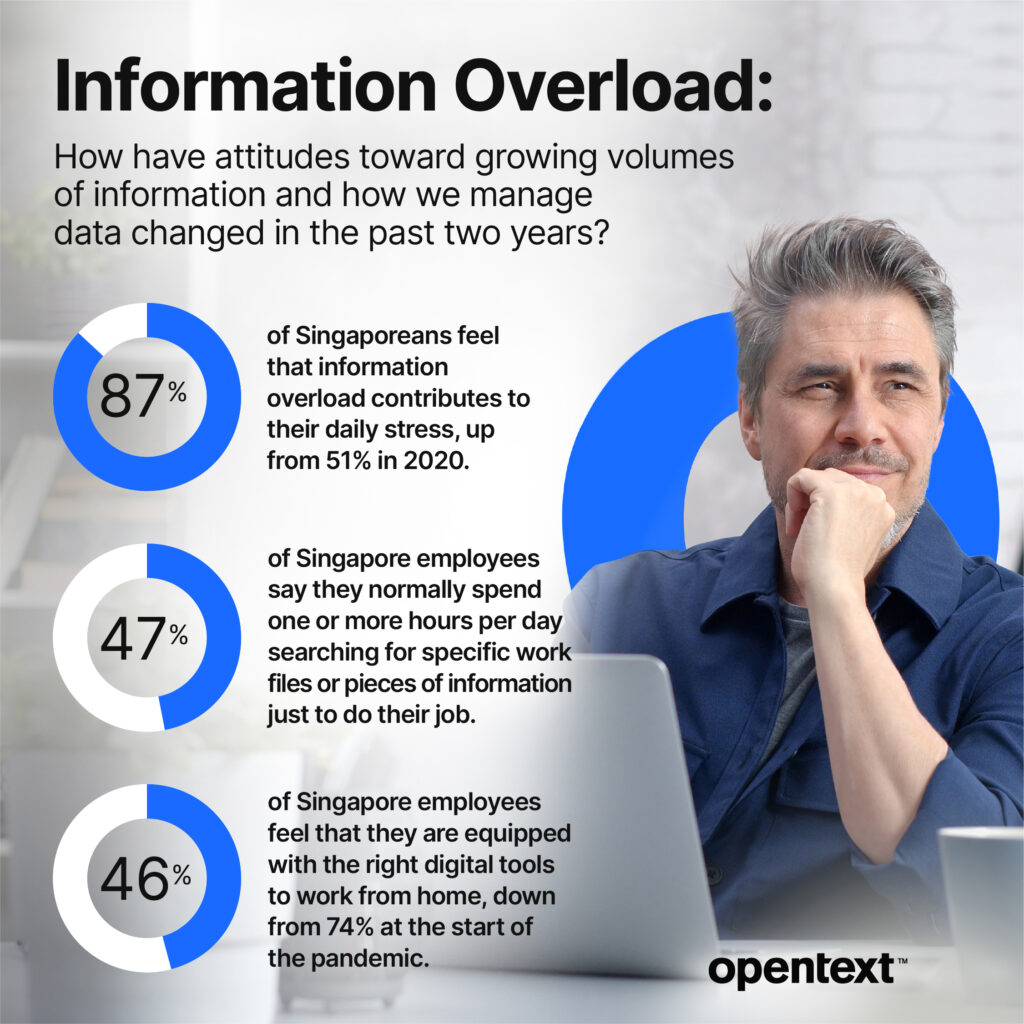
Source: Marco A. Gomez / US AIR FORCE / AFP
Information overload: can TOO much data be a business disadvantage?
These days, digitally mature industries are well aware of the business and productivity advantages of making use of data to enhance their operational and revenue efficiencies. Data and analysis of the same can inform sales, customer service, supply chains, and even retail floor improvements. But with the outpouring of data from so many points across the digitally driven businesses today, is there such thing as too much information leading to an overload?
OpenText asked that very same question, commissioning 3Gem to anonymously survey 27,000 consumers globally across the US, UK, Europe, Asia Pacific (APAC), and Brazil. Of the 1,000 individuals polled in Singapore to uncover the experience of employees – particularly during the pandemic – in interacting with data in this ‘new normal’, an overwhelming majority (87%) reported that the effects of information overload have been contributing to their daily stress levels – a massive increase over the 51% declared in the 2020 survey.
The incredible hike because of shifting work conditions, ranging from an upswing in hybrid working to increased adoption of digital tools to a swift migration to the cloud, is offset by an unexpected consequence of the faster rate of digitalization a lot of Singapore companies are going through. Less than half of Singaporean employees (46%) feel that the digital tools they have been provided with are the right ones, which is a huge drop in sentiment from the beginning of the COVID-19 restrictions that saw 74% of workers saying they were satisfied with the digital tools provided as they worked from home.
Even worse, nearly half (47%) of in 2022 study felt that they had to spend at least an hour or more per day sourcing for the right information or file location, causing an overload of unnecessary stress and ill-spent time by the worker that could have been more effectively spent elsewhere. In an interesting twist for earlier in the pandemic, nearly half (46%) of Singapore hybrid workers now feel that they cannot share data or collaborate as effectively when working from home, and 44% claim accessing necessary file systems and corporate content is not as easy to access from a remote location.
The digital information overload is contrasted in some ways with the lack of information sources, or with the overly distributed nature of data in the modern Singaporean enterprise. Half of surveyed staff said that information scattered across multiple locations was a big reason they could not find the needed info, and two in five (42%) feel that not knowing where to find the most up-to-date information was a contributing factor.
These challenges, along with poor information management systems to streamline the flow of data, have been having a big effect on the mental wellbeing and stress levels of beleaguered Singapore workers, according to around half (49%) of those surveyed. Too many digital sources and the perceived information overload has been affecting the work performance of at least half, and 41% said it is denting their overall job satisfaction.
Perhaps most tellingly, slightly more than half (51%) believe that the data dilemma is having a direct impact on their work-life balance – a big cause for concern as many are hybrid workers operating our of their homes. A third of Singaporean respondents (32%) say they must use eleven or more accounts, resources, tools and apps on a daily basis, which is a far cry from the 16% who reported the same in the 2020 OpenText information overload survey.

Source: OpenText
The study suggests that since the onset of the pandemic, the data storage repositories and applications where the necessary info exists has grown exponentially in the last couple of years. Just to make things easier for themselves, more than two thirds (68%) of employees are using personal file sharing platforms like Google Drive, WhatsApp or Dropbox. Compounding matters is that 74% of those do not believe their company has any sort of policy against it, and might even be encouraging personal folder use as a convenient and immediate fix – despite the riskier security threat personal devices and services could present to the corporate network.
“As data from office workers, suppliers and customers continues to boom across every organization, and as the number of systems and applications they use continues to rise, so too do the risks,” commented Randy Goh, Regional Vice President, Asia at OpenText.
Goh added that there is an urgent need for businesses to automate information management and governance, so that content can be captured and classified, retention policies can be applied automatically and employees can easily access accurate, up-to-date information without having to trawl multiple applications.
“Only by taking these steps can organizations succeed in reducing complexity and enable employees to easily collaborate with their colleagues no matter what device or application they use or where and how they choose to work,” Goh concluded.
READ MORE
- Ethical AI: The renewed importance of safeguarding data and customer privacy in Generative AI applications
- How Japan balances AI-driven opportunities with cybersecurity needs
- Deploying SASE: Benchmarking your approach
- Insurance everywhere all at once: the digital transformation of the APAC insurance industry
- Google parent Alphabet eyes HubSpot: A potential acquisition shaping the future of CRM


